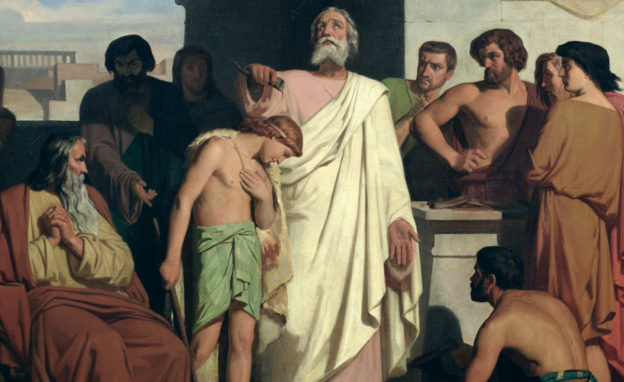How do we pick someone we think will be a good leader? Is it a telegenic personality, or charisma? Good looks or empathy off the charts? Someone who is confident and likes to meet and greet new people? Good public speaker? A successful business career, or success in sporting or academic pursuits? Wealth?
All of these things are the worldly ways in which some people make value assessments about leadership. It is the sort of thinking that led Israel to seek a king like Saul. It is not how God chooses leaders. We look on the outside; God looks on the heart. In this passage God chooses a new king, one who delights him and not the people; not even Samuel’s assumptions about kinghood. Just as Jesus delighted God, not man by outside appearance.
After Samuel rebuked Saul for his sin and said goodbye one last time, he returned to his home and grieved (15:35). Samuel was upset at the turn of events that saw God’s People led by an unfaithful man who did not follow God wholeheartedly. Would Saul lead all God’s People astray?
To Samuel’s weeping came God’s instruction, offering renewed hope. Samuel was to set aside his grieving and fill his horn with oil, to anoint a son of Jesse the Bethlehemite as a new king to replace Saul (v.1). To avoid Saul’s jealous attention, Samuel was to head to Bethlehem with a heifer to sacrifice to God, and invite Jesse and family to the festivities (vv.2-3).
Samuel did as commanded. Bethlehem was not a regular stopping point in Samuel’s regular journeys, so news of his arrival caused concern among the town leadership; what had gone wrong to deserve this attention (v.4)? Thankfully Samuel was just here to sacrifice, and they were invited! (v.5)
Jesse and his sons came along to the sacrifice event, and it came time for God to reveal to Samuel who the next king would be. Samuel looked on Jesse’s oldest, Eliab, and thought “Surely the LORD’s anointed is before him” (v.6). A tall and strapping young man, another visual feast for God’s People.
Not so fast, said God, “I have rejected him” (v.7). Even Samuel, God’s prophet, was suckered in by his eyes and worldly ideals. “For the LORD sees not as man sees: man looks on the outward appearance, but the LORD looks on the heart” (v.7).
So no to Eliab, and no to Abinadab (v.8). No to Shammah as well (v.9). Now Samuel and Jesse were getting down the list a little. Seven of his sons passed before Samuel, but the answer was the same. “The LORD has not chosen these” (v.10).
Were these all Jesse’s sons? (v.11) After all, God had specifically told Samuel that one of Jesse’s sons would be anointed king (v.1). Well, there was one, Jesse responded, “but behold, he is keeping the sheep” (v.11). Surely the youngest wasn’t of interest to God, Jesse thought, but Samuel by now knew better. There would be no sacrifice, and no food, until the shepherd boy came.
Sure enough, the youngest appeared, smelling of sheep, looking reddish but with “beautiful eyes and … handsome” (v.12). This was it! This was the one. “The Lord said, ‘Arise, anoint him, for this is he’” (v.12) The runt of the litter, the one that the older sons looked down on, the one Jesse did not bother to invite to the party, was the one God wanted.
And so “Samuel took the horn of oil and anointed him in the midst of his brothers” (v.13), and the Holy Spirit came upon that young man, whose name we finally learn was David, from that day onwards (v.13).
The world whispers about possible upcoming leaders with anticipation, but David appeared out of nowhere, from nowhere. Yet David’s reign was a key moment in salvation history. Every king after David was compared to him, and the promised Messiah was painted in David’s brush strokes.
David’s anointing shows that the leadership qualities we look to when choosing leaders, whether in politics or business, or even sometimes the Church, are not the qualities God looks for. Everyone’s ideas, even Samuel’s, were wrong.
What set David apart was what was in his heart. Our text does not say here, but it was not outward appearance. Our choice of leader, especially in the Church where God gives guidance, should follow his leading not ours.
Yet David’s anointing is important for who it looks forward to. His far-off descendant, Jesus, who also was anointed by the Holy Spirit. Who also had no form that men should look favourably upon him (Is. 53:1-3), and was rejected by Israel and its leadership. Who was also born in Bethlehem, the middle of nowhere.
And yet, who bore our griefs and sorrows, pleased God all his days, and reconciled us through his death to God. And who now reigns eternally, raised on high as our king, and as David’s king. Who pleased God in his heart.


